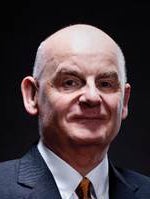Prof Barry Halliwell
|
|
Barry Halliwell D. Phil. (Oxford), D. Sc. (London) Programme Advisor, Neurobiology Research Programme, Life Sciences Institute, National University of Singapore (NUS) Senior Advisor, Academic Appointments and Research Excellence, Office of the Senior Deputy President and Provost, NUS Distinguished Professor, Dept of Biochemistry, Yong Loo Lin School of Medicine, NUS Chairman, Biomedical Advisory Council (BMAC), Agency for Science, Technology & Research (A*STAR) |
Major Research Interests
Understanding the molecular mechanisms of cell injury and death in human disease and in response to toxins. Antioxidants in nutrition, health and disease. Natural and synthetic antioxidants as therapeutic agents.
- Mechanisms of neurodegeneration in humans
- Elucidation of the role of iron in the development of human disease
- Antioxidants and pro-oxidants in the human diet in relation to health and disease
- Mechanisms of ageing in the nematode Caenorhabditis elegans and in human populations
Recent Publications
1. Wu LY, Cheuk NK, Cheah IK, Chong JR, Xu X, Vrooman H, Hilal S, Venketasubramanian N, Chen CP, Halliwell B, Lai MKP. (2022) Low plasma ergothioneine predicts cognitive and functional decline in an elderly cohort attending memory clinics. Antioxidants 11(9), 1717.
2. Murphy MP, Bayir H, Belousov V, Chang CJ, Davies KJ, Davies MJ, Dick TP, Finkel T, Forman HJ, Gems D, Janssen-Heininger Y, Kagan VE, Kalyanaraman B, Larsson NG, Mile GL, Nyström T, Poulsen HE, Radi R, Remmen HV, Schumacker PT, Thornalley PJ, Toyokuni S, Winterbourn CC, Yin H, Halliwell B. (2022) Guidelines for measuring reactive oxygen species and oxidative damage in cells and in vivo. Nature Metabolism 4, 651-662.
3. Cheah IK, Lee JZ, Tang RMY, Koh PW, Halliwell B. (2022) Does Lactobacillus reuteri influence ergothioneine levels in the human body? FEBS Letters 596(10), 1241-1251.
4. Wu LY, Cheah IK, Chong JR, Chai YL, Tan JY, Hilal S, Vrooman H, Chen CP, Halliwell B, Lai MKP. (2022) Low plasma ergothioneine levels are associated with neurodegeneration and cerebrovascular disease in dementia. Free Radic Biol Med. 177, 201-211.
5. Halliwell B, Adhikary A, Dingfelder M, Dizdaroglu M. (2021) Hydroxyl radical is a significant player in oxidative DNA damage in vivo. Chem. Soc. Rev. 50, 8355-8360.
6. Cheah IK, Halliwell B. (2021) Ergothioneine, recent developments. Redox Biol. 26, 101868.
7. Koh SS, Ooi SC, Lui NM, Qiong C, Ho LT, Cheah IK, Halliwell B, Herr DR, Ong WY. (2021) Effect of Ergothioneine on 7-Ketocholesterol-Induced Endothelial Injury. NeuroMolecular Med. 23, 184-198.
8. Cheah IK, Halliwell B. (2020) Could Ergothioneine Aid in the Treatment of Coronavirus Patients? Antioxidants (Basel). 9, 595.
9. Ng LT, Ng LF, Tang RMY, Barardo D, Halliwell B, Moore PK, Gruber J. (2020) Lifespan and healthspan benefits of exogenous H2S in C. elegans are independent from effects downstream of eat-2 mutation. NPJ Aging Mech Dis. 6, 6.
10. Teh DBL, Bansal A, Chai C, Toh TB, Tucker RAJ, Gammad GGL, Yeo Y, Lei Z, Zheng X, Yang F, Ho JS, Bolem N, Wu BC, Gnanasammandhan MK, Hooi L, Dawe GS, Libedinsky C, Ong WY, Halliwell B, Chow EK, Lim KL, Zhang Y, Kennedy BK. (2020) A Flexi-PEGDA Upconversion Implant for Wireless Brain Photodynamic Therapy. Adv Mater. 32, e2001459.
11. Teo E, Ravi S, Barardo D, Kim HS, Fong S, Cazenave-Gassiot A, Tan TY, Ching J, Kovalik JP, Wenk MR, Gunawan R, Moore PK, Halliwell B, Tolwinski N, Gruber J. (2019) Metabolic stress is a primary pathogenic event in transgenic Caenorhabditis elegans expressing pan-neuronal human amyloid beta. eLife 8, e50069.
12. Ng LF, Ng LT, van Breugel M, Halliwell B, Gruber J. (2019) Mitochondrial DNA damage does not determine C. elegans lifespan. Front Genet. 10, 311.
13. Feng L, Cheah I, Ng M, Li J, Chan SM, Lim SL, Mahendran R, Kua EH, Halliwell B. (2019) The association between mushroom consumption and mild cognitive impairment (MCI): a study in Singapore. J. Alzheimer Dis. 68, 197-203.
14. Butterfield DA and Halliwell B. (2019) Oxidative stress, dysfunctional glucose metabolism and Alzheimer disease. Nature Reviews Neuroscience 20, 148-160.
15. Lakshmanan LN, Yee ZL, Ng LF. Gunawan R, Halliwell B, Gruber J. (2018) Clonal expansion of mitochondrial DNA deletions is a private mechanism of ageing in long-lived animals. Aging Cell 17, e12814.
16. Halliwell B. (2018) Artefacts with ascorbate and other redox-active compounds in cell culture: epigenetic modifications, and cell killing due to hydrogen peroxide generation in cell culture media. Free Radic. Res. 52, 907-909.
17. Taverne YJ, Merkus D, Bogers AJ, Halliwell, B, Duncker DJ, Lyons TW. (2018) Reactive Oxygen Species: Radical Factors in the Evolution of Animal Life A molecular timescale from Earth’s earliest history to the rise of complex life. Bioessays 40, 1700158.
18. Halliwell B & Gutteridge JMC (2015) Free Radicals in Biology and Medicine. Clarendon Press, Oxford (5th edition), UK.
19. Halliwell B. (2014) Cell culture, oxidative stress, and antioxidants: avoiding pitfalls. Biomed. J. 37, 99-105.
20. Ng LF, Gruber J, Cheah I, Kiat Goo C, Fun Cheong W, Shui G, Ping Sit K, Wenk MR, Halliwell B. (2014) The mitochondria-targeted antioxidant, MitoQ extends lifespan and improves healthspan of a transgenic C. elegans models of Alzheimer disease. Free Radic Biol Med. 71, 390-401.


